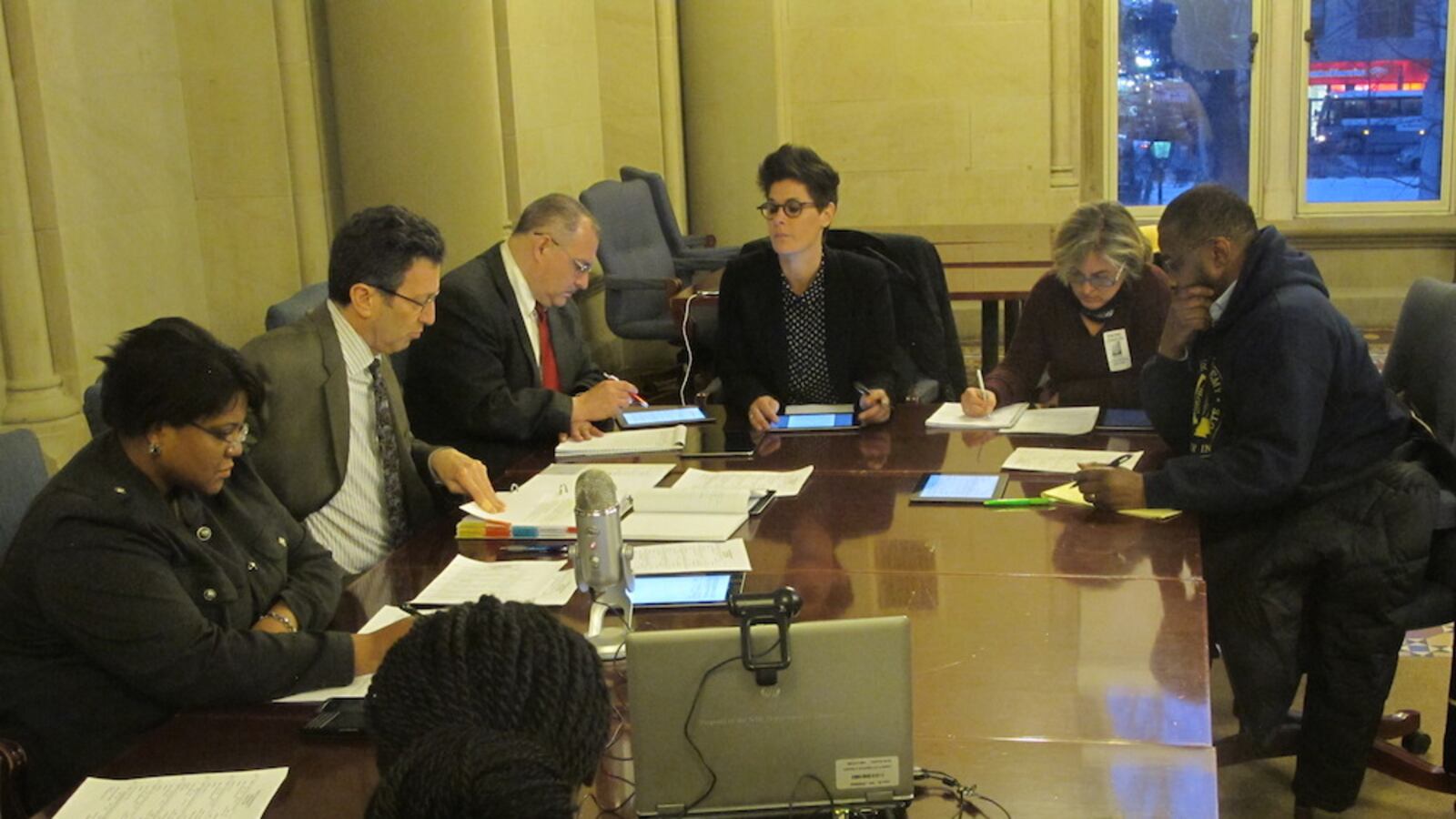A controversial contract to expand Internet access in city schools is stirring up a larger debate about mayoral control.
The Department of Education wants to award a contract worth up to $637 million to a technology firm whose ties to a kickback scandal just four years ago went undisclosed until Monday night, two days before the 13-member Panel for Educational Policy was set to vote on it. And despite requests for details about the five-year deal after a brief overview was released two weeks ago, panel members say they also were kept in the dark.
“A lot of the answers we used to get immediately, we’re not getting immediately,” said Robert Powell, who has served on the panel since 2012 and currently chairs the contracts committee.
The episode has prompted criticism from political allies of Mayor Bill de Blasio that echoes attacks he once lobbed as a public advocate and city councilman, when he argued for more public input and transparency around the city’s education decisions. Under the state’s mayoral control law, de Blasio appoints eight of 13 members on the panel, a school-governance system that state lawmakers are considering for renewal this year.
[Update: The city says it’s begun a review of its processes. Read more here.]
“It is shocking that the DOE thinks it is acceptable to vote on another contract without full disclosure and vetting available to the community, elected officials, and the public at large,” Public Advocate Letitia James, City Councilman Daniel Dromm, and Leonie Haimson, the executive director of the nonprofit Class Size Matters, wrote in a letter last week. (Haimson has closely covered the issue on her blog.)
Panel members are scheduled to vote on the contract on Wednesday. City officials on Tuesday defended the deal, and said it had to be approved soon or the city could lose out on federal technology funds.
Though the bureaucratic tangle may seem far removed from classrooms, the underlying debate is about who acts as a final check on the billions of dollars in outside spending that ensures schools get new textbooks, keeps pre-kindergarten programs afloat, and provides the infrastructure that brings the Internet into schools.
Providing more oversight over contracts was one of the goals of the reauthorized mayoral control law passed by state lawmakers in 2009. The law expires in June and is expected to be renewed, though not before the details of the structure are debated. Public Advocate James is holding five forums on the topic, beginning Wednesday.
Contracts were approved by the panel without many details after the change in 2009, but a string of scandals prompted the city to provide members with information a week or more ahead of votes. In the later years of Mayor Bloomberg’s tenure, that information was also released to the public ahead of time.
Under de Blasio, panel members said they have not received full documents showing what and how much other bidders had proposed and how those bids stacked up to the winner. The department has also not made that information available to the public and, last month, it was not posted until after the panel’s vote, according to Haimson.
“That’s unfortunately been typical of the new administration,” said Patrick Sullivan, a former panel member who led efforts to improve transparency under the previous administration.
One of the scandals that led to additional disclosure involved the company at the center of this week’s debate. Four years ago, a city investigation found that Custom Computer Specialists had helped conceal an outside consultant’s theft of $1.7 million over six years, something panel members say they were not made aware of even after Haimson blogged about the connection on Sunday.
City officials said that contract information is typically not made public until the city has completed its own thorough vetting process. But David Ross, who oversees contract procurement for the department, said Monday that there were “active discussions within the department” about giving the public earlier access to those details.
“I’m fairly comfortable that we’re within legal compliance, but we’re looking at doing better than that,” Ross said.
Custom Computer Specialists, which did not return a message to its office in Long Island, won its latest bid to wire schools for Internet access at an annual rate of $227.8 million for up to nine years, although that has since been renegotiated down to $127.5 million. A city official said the city had until March 23 to approve the contract or risk losing $25 million next year from the federal E-Rate program. That technology funding program was suspended in 2011 because of the scandal.
Ross said the new contract will be directly managed by Department of Education officials, an important safeguard that was not in place for the last contract. He also defended the decision to select Custom Computer Specialists, noting the firm’s record of success in other cities.
That’s not enough for critics, who see the vote as a litmus test for whether panel members are willing to break with the city on important issues.
“At that point we will see just how independent the members are, and who they actually represent,” Haimson posted to her email group.
In interviews, some panel members said that while they shared some concerns about the department’s transparency, they rejected the notion that their votes should be seen in such terms.
“It’s one thing to advocate and it’s a completely other thing to govern,” said Lori Podvesker, who was appointed by de Blasio. “That doesn’t make it OK for them not to be transparent, but there’s a whole different set of responsibilities involved when you’re governing.”


